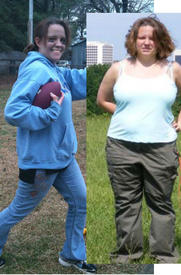Is gluten free a fad like fat free was?

cheria67
Posts: 7 Member
What do you think about all the info about gluten free? What about leaky gut syndrome?
0
Replies
-
Well some people all allergic to wheat, so there is that big difference.
I do think it's became a bit of a fad. In the end though, whatever works to get people healthy though.0 -
Valid syndrome. Valid intolerances. Not everyone, but some people.
Those who need to go gluten free for health purposes have a hard hill to climb. No one would choose that on purpose unless they found gluten to be a harmful substance for them. It's tough to eliminate it 100% - gluten is in so many processed foods.
Fat free was dangerous. Gluten free can be just a choice, without the negative consequences that occur when attempting fat free. You certainly don't need gluten to survive and thrive. Lots of people find that by cutting it out they have the ability to abstain from lots of food items that serve no real purpose in nutrition. So it's an easy thing to cut back on or semi-eliminate for weight loss purposes.
.0 -
I think that a lot of people are eating gluten free when they don't have to because they think that there is some kind of additional benefit, but the only benefit is getting rid of wheat. It doesn't change calories, fat, etc, in the products.
Now, for people that do actually have to eat gluten free, it's obviously more vital. And there has been a steady increase in food related allergies over the years including both gluten and nuts as top contenders. So the amount of gluten free products has started to take off due to that increase of actual need.
No one is exactly sure why the increase in food related allergies is happening. I've seen studies linking it to everything from the additives in our drinking water to it simply being a generation that grew up on more processed foods in their diets and so their little, growing, bodies just didn't develop all of the proper inner workings to react to and digest things. But whatever the reason, allergies and diagnosed intolerances are starting to become basically commonplace in our society.
And, as with pretty much any product like gluten free, it will be latched onto as something that can be helpful to more than just the targeted group it's being made for. "It's wheat-free! Our ancestors didn't have wheat, so we shouldn't eat wheat, so we'll eat gluten free!"
So for some people it's a fad that will die out with the next new food thing to hit the market. But for some it will be a forever constant way of life due to specific dietary and health needs.0 -
Well some people all allergic to wheat, so there is that big difference.
I do think it's became a bit of a fad. In the end though, whatever works to get people healthy though.
I completely agree.0 -
Personally, being gluten free has solved some very serious issues that I was having. The doctors couldn't explain what was wrong with me, so I started experimenting and it turns out that I have (self-identified) a gluten intolerance. I had a blood test for celiacs just to be sure that it doesn't go further than an intolerance and it came back neg. Of course, I hadn't ingested gluten for months by the time I had that test, so it's possible that it could be incorrect...
I think the majority of the population would see positive results by not eating gluten or even reducing it. For my husband, it has helped with his joint pain. I think gut inflammation affects so much: immunity, fat loss, skin health...etc., that it's worth a shot for pretty much anybody to try it. The only caution that I have is this: Once you quit eating it for a month or so, when you do eat it, you may have some VERY unpleasant consequences 0
0 -
Read Wheat Belly and make your own decision. The doctor who wrote the book explains that most of the population has some kind of wheat sensitivity but shows its face in various ways. Weight gain is just one of them. Other stuff includes acne, IBS and a large range of other symptoms. It's the best book I ever read and I'm so glad that I read it before it was too late. It's a life changer for sure.0
-
If you have a valid 'issue' then it's good to go. If you don't - eat normal! Apparently if you focus on solely gluten free and you don't have an intolerance you may actually be doing more harm than good!0
-
Also, a gluten-free processed food isn't necessarily a healthy option. I stay away from that stuff too. Whatever they put in it to replace the gluten probably isn't good for me either. So, in that sense, there is a dangerous fad attached to gluten-free. All these new "gluten-free" junk foods are still junk foods.0
-
1 in 133 people in America are gluten intolerant. Only 10 percent know it. The drugs companies do not care about because the cure is diet. Doctors get information and continuing education from the pharmaceutical industry. It is not a fad but it is not a weight loss plan either.0
-
for those with a gluten allergy it is NOT a fad....I get physically ILL when I consume gluten so this is not a "fad" for me. Now, for others who arent sensitive to gluten or who don't know if they are, then yes it could be a fad like the low fat thing.0
-
No Fad for my husband...serious medical condition0
-
Fad started by the Wheat Belly book (which is full of errors and speculation). If you have a gluten sensitivity then definitely you need to be gluten free. If you don't you're wasting your time avoiding something.0
-
Just back from 2 weeks in Australia and boy is Gluten Free all over Down Under! I've been pretty much Gluten Free for several years and it's been very beneficial. Not only has it gotten me from eating so much processed foods it has also really helped me reduce my overall inflamation and decrease allot of aches and pains.
I'm not really "allergic" to Wheat but while working with a Nutritionist a few years ago she asked me to try Gluten free to see if it will help reduce various aches and pains I have. I was working out allot with heavy weights and knees, back, elbows, etc were all sore.
Much to my surprise 80% or more of my achiness went away and I got even stronger. So while in no way do I think I have Celiac disease it's pretty obvious that Gluten causes some type of reaction in my body.
I've cheated from time to time and have had gluten products either on purpose or by accident and would always feel the difference the next day. Tired, achey, cranky, etc..
So this might not be for everyone it's a permanent life choice for me now.0 -
Read Wheat Belly and make your own decision. The doctor who wrote the book explains that most of the population has some kind of wheat sensitivity but shows its face in various ways. Weight gain is just one of them. Other stuff includes acne, IBS and a large range of other symptoms. It's the best book I ever read and I'm so glad that I read it before it was too late. It's a life changer for sure.
It would have been an even better book if any of his "facts" were true.0 -
I think that a lot of people are eating gluten free when they don't have to because they think that there is some kind of additional benefit, but the only benefit is getting rid of wheat. It doesn't change calories, fat, etc, in the products.
Now, for people that do actually have to eat gluten free, it's obviously more vital. And there has been a steady increase in food related allergies over the years including both gluten and nuts as top contenders. So the amount of gluten free products has started to take off due to that increase of actual need.
No one is exactly sure why the increase in food related allergies is happening. I've seen studies linking it to everything from the additives in our drinking water to it simply being a generation that grew up on more processed foods in their diets and so their little, growing, bodies just didn't develop all of the proper inner workings to react to and digest things. But whatever the reason, allergies and diagnosed intolerances are starting to become basically commonplace in our society.
And, as with pretty much any product like gluten free, it will be latched onto as something that can be helpful to more than just the targeted group it's being made for. "It's wheat-free! Our ancestors didn't have wheat, so we shouldn't eat wheat, so we'll eat gluten free!"
So for some people it's a fad that will die out with the next new food thing to hit the market. But for some it will be a forever constant way of life due to specific dietary and health needs.
Wheat Belly explains the phenomena regarding the increase in sensitivity. The doctor goes into great detail of his research and how the wheat of today is genetically modified and not good for human consumption.0 -
For the most part, yes.
Going "gluten-free" is only necessary if you have an intolerance to gluten. However, I have a sneaking suspicion that most of the people going gluten-free have done so because someone's sister "lost soooo much weight" doing it, not because they actually have an allergy to gluten.0 -
I think that a lot of people are eating gluten free when they don't have to because they think that there is some kind of additional benefit, but the only benefit is getting rid of wheat. It doesn't change calories, fat, etc, in the products.
Now, for people that do actually have to eat gluten free, it's obviously more vital. And there has been a steady increase in food related allergies over the years including both gluten and nuts as top contenders. So the amount of gluten free products has started to take off due to that increase of actual need.
No one is exactly sure why the increase in food related allergies is happening. I've seen studies linking it to everything from the additives in our drinking water to it simply being a generation that grew up on more processed foods in their diets and so their little, growing, bodies just didn't develop all of the proper inner workings to react to and digest things. But whatever the reason, allergies and diagnosed intolerances are starting to become basically commonplace in our society.
And, as with pretty much any product like gluten free, it will be latched onto as something that can be helpful to more than just the targeted group it's being made for. "It's wheat-free! Our ancestors didn't have wheat, so we shouldn't eat wheat, so we'll eat gluten free!"
So for some people it's a fad that will die out with the next new food thing to hit the market. But for some it will be a forever constant way of life due to specific dietary and health needs.
Wheat Belly explains the phenomena regarding the increase in sensitivity. The doctor goes into great detail of his research and how the wheat of today is genetically modified and not good for human consumption.
Which is more than likely why gluten intolerance is cropping up all over the place.0 -
Yes. But people do seem to have what you could call "intolerances" to certain foods quite easily and possibly gluten is one thing that causes this. Possibly also the nature of the protein has changed a bit with modern factory bread baking and hexaploid wheat? I don't know. Such food intolerances are not true allergies so there isn't a definitive test for them (this isn't saying that they are imaginary but they don't form part of a classic type 1 hypersensitivity reaction most of the time) so it can be hard to draw firm conclusions about them. All you can do I think is experiment as clinically as possible with/without/with/without etc and see the effect on yourself while reminding yourself that the placebo effect might be strong and possibly misleading at first.0
-
Read Wheat Belly and make your own decision. The doctor who wrote the book explains that most of the population has some kind of wheat sensitivity but shows its face in various ways. Weight gain is just one of them. Other stuff includes acne, IBS and a large range of other symptoms. It's the best book I ever read and I'm so glad that I read it before it was too late. It's a life changer for sure.
It would have been an even better book if any of his "facts" were true.
Links to debunk his facts are appreciated if you're making such statements.
Myself and my husband have seen great benefits including acne clearing up, year round allergies diminished, cellulite fading, acid reflux cured, and that's just the tip of the iceberg. I didn't read his book until AFTER I stopped the wheat. Results speak for themselves.0 -
Probably somewhat. But people do seem to have what you could call "intolerances" to certain foods quite easily and possibly gluten is one thing that causes this. Possibly also the nature of the protein has changed a bit with modern factory bread baking and hexaploid wheat? I don't know. Such food intolerances are not true allergies so there isn't a definitive test for them (this isn't saying that they are imaginary but they don't form part of a classic type 1 hypersensitivity reaction most of the time) so it can be hard to draw firm conclusions about them.
There is a definitive test for Celiacs which is a gluten intolerance/allergy.0 -
Fad unless youre one of the very few with celiac's disease0
-
Read Wheat Belly and make your own decision. The doctor who wrote the book explains that most of the population has some kind of wheat sensitivity but shows its face in various ways. Weight gain is just one of them. Other stuff includes acne, IBS and a large range of other symptoms. It's the best book I ever read and I'm so glad that I read it before it was too late. It's a life changer for sure.
This is on my list to read. I limit wheat and grains to once a week on my cheat day and notice that I feel bloated and just slow and lazy when I eat them. I also find that limiting them gives me more steady energy throughout the day. I don't feel tired an hour after lunch like I do if I eat a bunch of bread or rice.
For people who are truly allergic it can be a life altering experience to get diagnosed and on a gluten-free diet. I've seen people truly transformed by it.0 -
If it's a fad, I am grateful for it. I don't avoid gluten entirely, but I do try to limit it and not over indulge in foods that contain it. I grew up eating lots of breads and pasta. I never realized that kind of bloated/icky feeling I got after eating wasn't necessarily from having too much. It wasn't until I started losing weight that I realized that feeling wasn't directly related to quantity of food but type of food.
I still consume gluten (though I am very careful about serving sizes) because I am not a serious case -- but I am glad to have the knowledge.0 -
Fad unless youre one of the very few with celiac's disease
1 in 133 is not a very few. It is scary number.0 -
If you have a valid 'issue' then it's good to go. If you don't - eat normal! Apparently if you focus on solely gluten free and you don't have an intolerance you may actually be doing more harm than good!
Harm, how? Also, what does it mean to "eat normal"? To eat a lot of processed food?0 -
1 in 133 people in America are gluten intolerant. Only 10 percent know it. The drugs companies do not care about because the cure is diet. Doctors get information and continuing education from the pharmaceutical industry. It is not a fad but it is not a weight loss plan either.
^^this! The weigh loss that (usually) comes with it is a side effect of being healthier.0 -
Wheat Belly is full of half-truths and speculation. It is not backed by rigorous scientific experiment.
Read this:
http://noglutennoproblem.blogspot.ca/2012/03/wheat-belly-busted.html0 -
Read Wheat Belly and make your own decision. The doctor who wrote the book explains that most of the population has some kind of wheat sensitivity but shows its face in various ways. Weight gain is just one of them. Other stuff includes acne, IBS and a large range of other symptoms. It's the best book I ever read and I'm so glad that I read it before it was too late. It's a life changer for sure.
This is on my list to read. I limit wheat and grains to once a week on my cheat day and notice that I feel bloated and just slow and lazy when I eat them. I also find that limiting them gives me more steady energy throughout the day. I don't feel tired an hour after lunch like I do if I eat a bunch of bread or rice.
For people who are truly allergic it can be a life altering experience to get diagnosed and on a gluten-free diet. I've seen people truly transformed by it.
Hi there! I'm right there with you on the energy level observation. I find if I replace wheat with healthy fats, carbs and proteins, I do not have the roller coaster blood sugar crashes. There are definitely loads of benefits to the lifestyle.
You'll enjoy Wheat Belly. He goes into great detail, and some of it is kind of techy, but loads of great info. A lot of it is shocking to say the least. For example, how you can test your blood sugar after wheat and after eating chocolate, and wheat raises blood sugar HIGHER than chocolate. This is true because my brother is diabetic and has tested his theories. Crazy stuff like that.0 -
Wheat Belly is full of half-truths and speculation. It is not backed by rigorous scientific experiment.
Read this:
http://noglutennoproblem.blogspot.ca/2012/03/wheat-belly-busted.html
Ha ha :laugh: Don't use blogspot as a source for reliable info.
I have no postition on gluten. Well, except I only have it once a week. But, blogspot is not a resource. Anyone can say anything in a blog or book. Doesn't make it so.0 -
I am intolerant of gluten. I think it is the leaky gut thing. If I eat bread, my finger joints swell so that I can not even bend my fingers. Very painful. However, I do think this was a blessings. I think that wheat spikes hunger. If I had toast and eggs for breakfast, I was hungry an hour later.
I tried high lean protein and vegetable diet and found my arthritis subsided, my hunger became managable, and finally when I added other starches, corn, potatoes, peas, beans, they did not spike my hunger so I regained control.0
This discussion has been closed.
Categories
- All Categories
- 1.4M Health, Wellness and Goals
- 398.1K Introduce Yourself
- 44.7K Getting Started
- 261K Health and Weight Loss
- 176.4K Food and Nutrition
- 47.7K Recipes
- 233K Fitness and Exercise
- 462 Sleep, Mindfulness and Overall Wellness
- 6.5K Goal: Maintaining Weight
- 8.7K Goal: Gaining Weight and Body Building
- 153.5K Motivation and Support
- 8.4K Challenges
- 1.4K Debate Club
- 96.5K Chit-Chat
- 2.6K Fun and Games
- 4.8K MyFitnessPal Information
- 12 News and Announcements
- 21 MyFitnessPal Academy
- 1.5K Feature Suggestions and Ideas
- 3.2K MyFitnessPal Tech Support Questions
















